Xianhua Yu
Dual-Mapping Sparse Vector Transmission for Short Packet URLLC
Jan 22, 2026Abstract:Sparse vector coding (SVC) is a promising short-packet transmission method for ultra reliable low latency communication (URLLC) in next generation communication systems. In this paper, a dual-mapping SVC (DM-SVC) based short packet transmission scheme is proposed to further enhance the transmission performance of SVC. The core idea behind the proposed scheme lies in mapping the transmitted information bits onto sparse vectors via block and single-element sparse mappings. The block sparse mapping pattern is able to concentrate the transmit power in a small number of non-zero blocks thus improving the decoding accuracy, while the single-element sparse mapping pattern ensures that the code length does not increase dramatically with the number of transmitted information bits. At the receiver, a two-stage decoding algorithm is proposed to sequentially identify non-zero block indexes and single-element non-zero indexes. Extensive simulation results verify that proposed DM-SVC scheme outperforms the existing SVC schemes in terms of block error rate and spectral efficiency.
Adaptive Phase Shift Information Compression for IRS Systems: A Prompt Conditioned Variable Rate Framework
Nov 05, 2025Abstract:Intelligent reflecting surfaces (IRSs) have become a vital technology for improving the spectrum and energy efficiency of forthcoming wireless networks. Nevertheless, practical implementation is obstructed by the excessive overhead associated with the frequent transmission of phase shift information (PSI) over bandwidth-constrained control lines. Current deep learning-based compression methods mitigate this problem but are constrained by elevated decoder complexity, inadequate flexibility to dynamic channels, and static compression ratios. This research presents a prompt-conditioned PSI compression system that integrates prompt learning inspired by large models into the PSI compression process to address these difficulties. A hybrid prompt technique that integrates soft prompt concatenation with feature-wise linear modulation (FiLM) facilitates adaptive encoding across diverse signal-to-noise ratios (SNRs), fading kinds, and compression ratios. Furthermore, a variable rate technique incorporates the compression ratio into the prompt embeddings through latent masking, enabling a singular model to adeptly balance reconstruction accuracy. Additionally, a lightweight depthwise convolutional gating (DWCG) decoder facilitates precise feature reconstruction with minimal complexity. Comprehensive simulations indicate that the proposed framework significantly reduces NMSE compared to traditional autoencoder baselines, while ensuring robustness across various channel circumstances and accommodating variable compression ratios within a single model. These findings underscore the framework's promise as a scalable and efficient solution for real-time IRS control in next-generation wireless networks.
Phase Shift Information Compression in IRS-aided Wireless Systems: Challenges and Opportunities
May 07, 2025Abstract:Intelligent reflecting surfaces (IRS) have emerged as a promising technology for future 6G wireless networks, offering programmable control of the wireless environment by adjusting the phase shifts of reflecting elements. However, IRS performance relies on accurately configuring the phase shifts of reflecting elements, which introduces substantial phase shift information (PSI) delivery overhead, especially in large-scale or rapidly changing environments. This paper first introduces the architecture of IRS-assisted systems and highlights real-world use cases where PSI delivery becomes a critical bottleneck. It then reviews current PSI compression approaches, outlining their limitations in adaptability and scalability. To address these gaps, we propose a prompt-guided PSI compression framework that leverages task-aware prompts and meta-learning to achieve efficient and real-time PSI delivery under diverse conditions. Simulation results show improved reconstruction accuracy and robustness compared to the baseline method. Finally, we discuss open challenges and outline promising directions for future research.
Meta-Learning Driven Lightweight Phase Shift Compression for IRS-Assisted Wireless Systems
May 07, 2025



Abstract:The phase shift information (PSI) overhead poses a critical challenge to enabling real-time intelligent reflecting surface (IRS)-assisted wireless systems, particularly under dynamic and resource-constrained conditions. In this paper, we propose a lightweight PSI compression framework, termed meta-learning-driven compression and reconstruction network (MCRNet). By leveraging a few-shot adaptation strategy via model-agnostic meta-learning (MAML), MCRNet enables rapid generalization across diverse IRS configurations with minimal retraining overhead. Furthermore, a novel depthwise convolutional gating (DWCG) module is incorporated into the decoder to achieve adaptive local feature modulation with low computational cost, significantly improving decoding efficiency. Extensive simulations demonstrate that MCRNet achieves competitive normalized mean square error performance compared to state-of-the-art baselines across various compression ratios, while substantially reducing model size and inference latency. These results validate the effectiveness of the proposed asymmetric architecture and highlight the practical scalability and real-time applicability of MCRNet for dynamic IRS-assisted wireless deployments.
Pushing the Limit of Phase Shift Feedback Compression for Intelligent Reflecting Surface-Assisted Wireless Systems by Exploiting Global Attention
Jul 05, 2022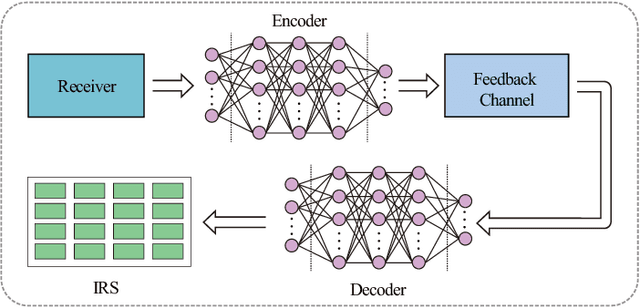
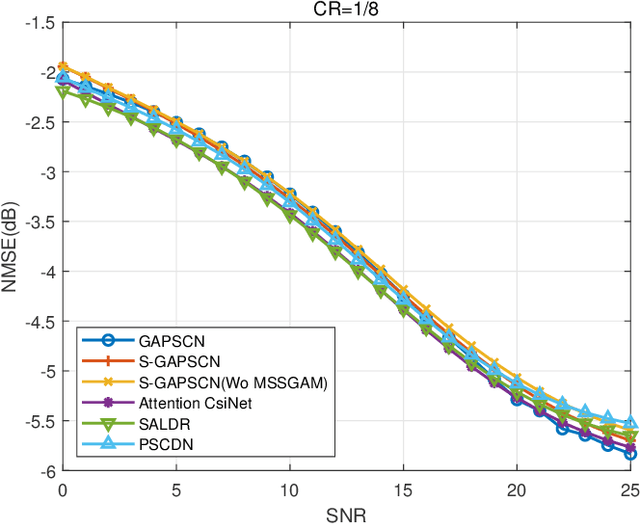
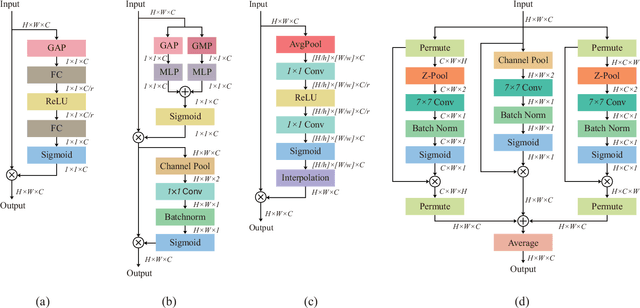
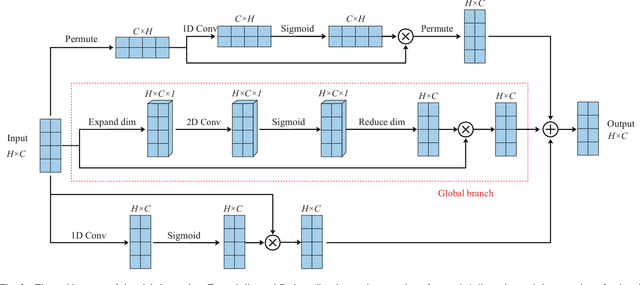
Abstract:Intelligent reflecting surface (IRS) has recently appeared as a potential technology for 6G, and received much attention from academia and industry. However, most of existing works on IRS focus on how to compute the phase shift for performance enhancement, and the problem on how to obtain the computed phase shift at the IRS side is generally neglected. In this paper, we consider compressing the computed phase shift at the receiver side to the IRS through a bandwidth-limited feedback channel. In particular, we propose and investigate a novel attention mechanism named as global attention by exploiting the attention map over both spatial and channel dimensions. This allows us to to push the limit of phase shift feedback compression by utilizing the two-dimensional information, which is in sharp contrast to exiting works that only consider either the spatial or channel dimension. Besides, to cope with the problem of mismatched distribution of the phase shift, we introduce the generalized divisive normalization (GDN) layer and inverse generalized divisive normalization (IGDN) layer to the proposed global attention phase shift compression network (GAPSCN). Furthermore, due to practical constraints on the IRS, it is desirable to consider a simplified GAPSCN (S-GAPSCN), where a lightweight multi-scale simplified global attention module (MSSGAM) is proposed in the decoder located at the IRS side to compensate for the performance degradation due to the simplified structure. Simulation results show that the proposed GAPSCN is able to achieve a reconstruction accuracy close to 1 and performs much better than existing algorithms. The performance of the proposed S-GAPSCN can approach that of the GAPSCN but with a much lower computational load.
Convolutional Autoencoder-Based Phase Shift Feedback Compression for Intelligent Reflecting Surface-Assisted Wireless Systems
Oct 27, 2021
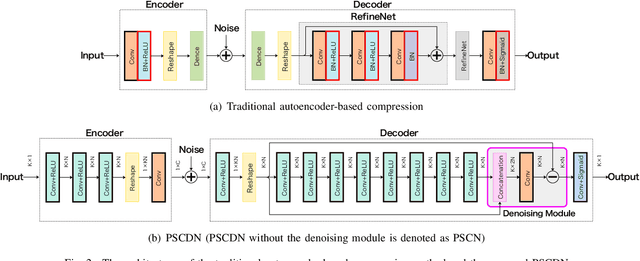


Abstract:In recent years, intelligent reflecting surface (IRS) has emerged as a promising technology for 6G due to its potential/ability to significantly enhance energy- and spectrum-efficiency. To this end, it is crucial to adjust the phases of reflecting elements of the IRS, and most of the research works focus on how to optimize/quantize the phase for different optimization objectives. In particular, the quantized phase shift (QPS) is assumed to be available at the IRS, which, however, does not always hold and should be fed back to the IRS in practice. Unfortunately, the feedback channel is generally bandwidth-limited, which cannot support a huge amount of feedback overhead of the QPS particularly for a large number of reflecting elements and/or the quantization level of each reflecting element. In order to break this bottleneck, in this letter, we propose a convolutional autoencoder-based scheme, in which the QPS is compressed on the receiver side and reconstructed on the IRS side. In order to solve the problems of mismatched distribution and vanishing gradient, we remove the batch normalization (BN) layers and introduce a denosing module. By doing so, it is possible to achieve a high compression ratio with a reliable reconstruction accuracy in the bandwidth-limited feedback channel, and it is also possible to accommodate existing works assuming available QPS at the IRS. Simulation results confirm the high reconstruction accuracy of the feedback/compressed QPS through a feedback channel, and show that the proposed scheme can significantly outperform the existing compression algorithms.
 Add to Chrome
Add to Chrome Add to Firefox
Add to Firefox Add to Edge
Add to Edge